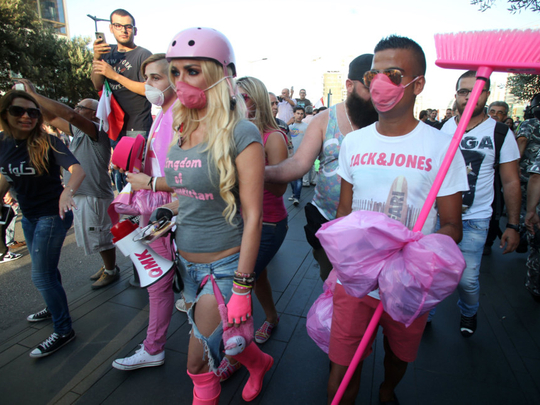
Beirut: Few expected the grassroots #YouStink demonstrations to mobilise a large group of Lebanese—estimated at 50,000 by activists and 10,000 by security forces—though that was precisely what occurred on Saturday evening as thousands lambasted the entire political establishment. Organizers concluded their gathering with four specific demands as well as the promise to escalate their activities in Beirut and in “different areas across Lebanon” within 72 hours if these were not met.
The chief demand called for the resignation of the Minister of Environment Mohammad Machnouk who they accused of dereliction of duty, particularly regarding the ongoing and increasingly intolerable garbage crisis. In addition, #YouStink and #WeDemandAccountability, called for holding the Minister of Interior, Nouhad Machnouk, liable for the security forces’ previous actions when Internal Security Forces used force to disperse protestors.
Campaign leaders added two fresh requirements: parliamentary elections and the transfer of waste management authority to municipalities by handing over state money owed the latter to clean up the streets.
The peaceful anti-government protests were blemished by the return of hooligans to Riad al-Solh Square near the Grand Serail [Government House] a few hours later, when several threw firecrackers and empty bottles across barbed wire fences. Television broadcasts showed a group of protestors chanting “Hezbollah, Hezbollah” and “Abu Hadi” in reference to party chief Hassan Nasrallah. Tense moments followed as shirtless and masked hoodlums crossed the two barbed wire fences and began throwing rocks on policemen. What followed was agonizingly long as the assailants taunted officers while scuffling with protestors trying to convince them to back down. Riot police deployed later in the evening, dispersing the remaining dissenters, and arresting several of their leaders. Army vehicles were deployed too, with authorities adamant that they would respond to hooliganism. No water cannons, tear gas, sound grenades, rubber bullets or live ammunition were used.
Assad Thebian, one of the #You Stink movement organizers, underlined that the Lebanese people were “united, independent and against all” politicians. While the majority was against violence and were not afraid to confront political elites, calls for Mohammad Machnouk to resign fell on deaf ears. Machnouk did not wait 72 hours to respond and told the Al Nahar newspaper that he would not give up on his duties during this delicate stage “because it’s something I’m not used to.” It was unclear whether Prime Minister Tammam Salam would hold Machnouk accountable for mismanaging the ongoing trash crisis that will soon reach a two-months milestone with no end in sight.
In what was a new phenomenon, demonstrators shunned all political parties on Saturday, and only raised the country’s national flag. Numerous posters against established party leaders were visible, including both March 8 and 14 officials. Most of those accused of corruption kept away from the media, although second-ranked tenors graced the airwaves by adding their voices to the ongoing cacophony.
On Friday, the Free Patriotic Movement chief General Michel Aoun invited his supporters to hold a separate demonstration on September 4 “to ask for reform and for participation in the decision-making process, and to fight corruption.” Aoun also called for the popular election of a president, and while he backed the #YouStink Movement, he disagreed with the latter over accusations of dishonesty. “We are glad that the people woke up and began demanding their rights,” he declared, though he stressed that the FPM would not take part in the demonstrations. It did not.
The coming week promised to be eventful as the Tuesday deadline loomed over the horizon, followed on September 2 by the 28th parliamentary session to elect a president, coincidentally scheduled two days before FPM protestors displayed their muscle.












